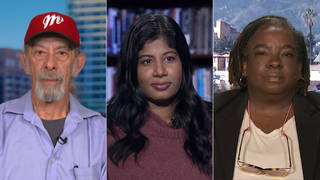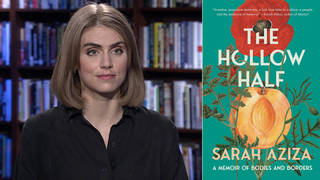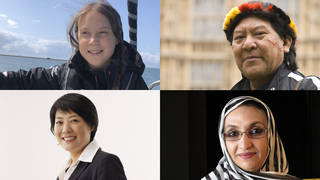
Guests
- Oliver Courtneysenior campaigner with Global Witness and the lead author of the new report, “Deadly Environment: The Dramatic Rise in Killings of Environmental and Land Defenders.”
A new reports finds the killings of environmental and land rights activists worldwide has tripled over the past decade. The group Global Witness documented 147 activists who were killed in 2012, compared to 51 in 2002. The death rate is now an average of two per week. Almost none of the killers have faced charges. We air interviews with some of the late activists featured in the report, including José da Silva, a Brazilian conservationist and environmentalist who campaigned against logging and clearcutting of trees in the Amazon rainforest. In 2011, José and his wife, Maria, were murdered by masked gunmen. “This could be the tip of the iceberg in terms of the scale of the real problem,” says Global Witness campaigner Oliver Courtney, who says details about the murders were nearly impossible to locate.
Transcript
AMY GOODMAN: A new report says the killings of environmental activists defending land rights worldwide has surged over the past decade. The group Global Witness documented 147 activists who were killed in 2012, compared to 51 in 2002. The death rate is now an average of two per week. Brazil was the world’s deadliest country for environmental defenders, with 448 deaths between 2002 and 2013. Honduras was second with 109 deaths over that same, well, little bit more than a decade.
One of the activists featured in the report is José da Silva, a Brazilian conservationist and environmentalist who campaigned against logging and clearcutting of trees in the Amazon rainforest. In 2011, José and his wife Maria were murdered by masked gunmen. José’s ear was ripped out as proof of execution. Before his execution, José da Silvia described the difficulties he and other environmentalists face.
JOSÉ DA SILVA: [translated] It’s a very uneven fight between us environmentalists and the buying power of money. We fight for everything, then someone shows up and throws his money on top of the misery of someone who lives there, and they entice the guy to start destroying the forest. I’m protecting nature, because I live in the middle of it and won’t sell it.
AMY GOODMAN: That was José da Silva, a Brazilian environmentalist who was murdered in 2011 by masked gunmen. In 2012, the United Nations posthumously recognized José and his wife Maria as forest heroes.
For more, we go to London, where we’re joined by Oliver Courtney, senior campaigner with Global Witness and the lead author of their new report, “Deadly Environment: The [Dramatic] Rise [in] Killings of Environmental and Land Defenders.”
Oliver Courtney, welcome to Democracy Now! Explain what you have found.
OLIVER COURTNEY: Well, as you’ve said, we found a sharp rise in the number of people getting killed defending their rights to land and the environment, people like José da Silva and his wife. And what we found is, and what’s the most—perhaps the most worrying, is we really feel that this could be just the tip of the iceberg in terms of the scale of the real problem. Information about what’s happening to activists, like we just saw, is very hard to come by and even harder to verify. On the back of that, there seems to be an enormous level of impunity attached to—attached to this problem. So whilst the vast majority of killings, there’s almost nothing known about the perpetrator and who was behind it. And we’ve seen just 1 percent of cases, in our analysis, has seen a conviction, so the person has actually been brought to justice. We think that this kind of level of impunity obviously has a knock-on effect in terms of silencing further dissent. And those who would protect the environment are being killed in ever greater numbers, when really they should be being protected as heroes.
AMY GOODMAN: Let’s turn to a clip from the documentary A Fierce Green Fire. We’ll hear from Brazilian rubber tapper, union organizer Chico Mendes, who formed a workers’ union that fought to preserve the rainforest from cattle ranching and logging. This is part of the film that’s narrated by the Chilean novelist Isabel Allende.
CHICO MENDES: [translated] It was only in 1975, when the ranchers arrived, that I joined the union and cut less rubber.
ISABEL ALLENDE: The rubber tappers organized empates, or standoffs, nonviolent protests in the tradition of Gandhi and Martin Luther King, where they surrounded the trees and tried to explain what a disaster cutting down the forest was for everyone.
AMY GOODMAN: Chico Mendes was assassinated in 1988, a quarter of a century ago. If you could tell me, Oliver Courtney, about the current stories of those who have been killed and who is killing them?
OLIVER COURTNEY: Well, there are many stories, and it’s quite shocking that, actually, 25 years on since the death of Chico Mendes, we’re seeing such a spike in this—in this kind of crime. What we think lies behind and, in our analysis, what we’ve seen lies behind a lot of the killings is the rising competition in natural resources. And it needs to be pointed out that the vast majority of the killings that we’ve come across do involve people who are resisting the operations of companies, and often foreign companies, whether or not they are logging companies, agribusiness companies, carrying out land grabs, mining companies. They’re often ordinary people who are resisting these operations. As I’ve said, it’s very difficult often to pinpoint the exact perpetrator. There’s a very startling low number of convictions. But what we have seen is that they are resisting operations to these companies. And we do feel like it’s down to the companies to make sure that they’re not being associated with this kind of violence, and also that governments need to monitor this problem much more clearly and much more actively and protect those citizens who are facing these threats, ensure that any perpetrators are brought to justice.
AMY GOODMAN: I wanted to turn to Maria da Silva, she and her husband José murdered in 2011 while fighting to protect the Amazon rainforest from loggers. In this clip, Maria explains the challenges environmentalists face.
MARIA DA SILVA: [translated] The truth is, my friend, the struggle is not easy, because environmentalists are seen as people that hold back progress. That’s what makes it difficult. The most important thing is the courage.
AMY GOODMAN: Oliver Courtney, that—Maria was killed in 2011. Talk about how people are being defended today as they try to defend the Earth.
OLIVER COURTNEY: Well, our analysis is that there is very little protection for those kind of—those kind of activists. Global Witness actually was first prompted to look into this—into this issue in more detail by the killing of a friend and colleague of ours, a man named Chut Wutty,, who was a prominent Cambodian forest activist who was killed by military police in Cambodia whilst investigating illegal logging. To date, his case has been dropped by a provincial court. His family haven’t seen justice. And since he—in the months after he died, another journalist who was investigating illegal logging was found with an ax in his head in the boot of a car, and a young girl who was protesting the forced eviction from her village, a 14-year-old girl, was shot and killed by military police. So there really is very little protection for these people. They are often operating in and protesting in remote and often very risky areas and coming into contact with some very powerful and well-connected vested interests. We really feel it comes down to governments and companies to make sure that this problem is being monitored much better, and that crimes, where they are found, are prosecuted. That would send out a message that protect—those who protect the environment will also be protected.
AMY GOODMAN: Oliver, can you talk about João Luiz Telles Penetra?
OLIVER COURTNEY: Mr. Penetra was one of the most striking cases in our report, because we published our first round of research into this issue shortly before the Rio summit, and we tried to issue a wake-up call to the international community to say that we felt that this problem was increasing and that the threat to environmental activists was increasing, just before the—before delegates gathered to discuss better ways to protect the climate and the environment. Now, Mr. Penetra was an advocate for fishermen’s rights who had been fighting for the rights of local fishermen against the—against the advance of oil operations in the area. And now, the day after the summit ended in Rio, Mr. Penetra was abducted, and he was found executed with another campaigner just a few days later. We really think that sends out a symbol about how much needs to be done. He was one of 18 activists who were murdered in the month after Rio, which shows how far we have to go and how much work needs to be done by governments and the international community to make sure that these people who are laying their lives on the line to protect the environment are getting the protection they deserve.
AMY GOODMAN: I want to go out with the voices of these forest heroes. In 2012, the United Nations posthumously recognized Maria and José da Silva as forest heroes, the couple murdered in 2011 while fighting to protect the rainforest. Maria’s sister, Laísa Santos Sampaio, received the award on their behalf. We’ll end with her words.
LAÍSA SANTOS SAMPAIO: [translated] Maria and José Claudio not only defended the forest, but showed by practical example how to live with dignity in the forest, respecting its dynamics and all its species. In living with the forest, they were examples and taught children that one has more to gain keeping the forest alive than selling or burning it.
AMY GOODMAN: That was Laísa Santos Sampaio remembering her sister and brother-in-law, Maria and José da Silva, forest heroes. That does it for our show. Thanks so much to Oliver Courtney. We’ll link to the report, “Deadly Environment,” at democracynow.org.
Tonight, I’ll be doing a public interview with the Chilean novelist Isabel Allende—go to our website—here in New York.













Media Options